
This week on Mark Wallace’s blog, he takes a look at the importance of Election Day and our opportunity to vote early. Read more

This week on Mark Wallace’s blog, he takes a look at the importance of Election Day and our opportunity to vote early. Read more
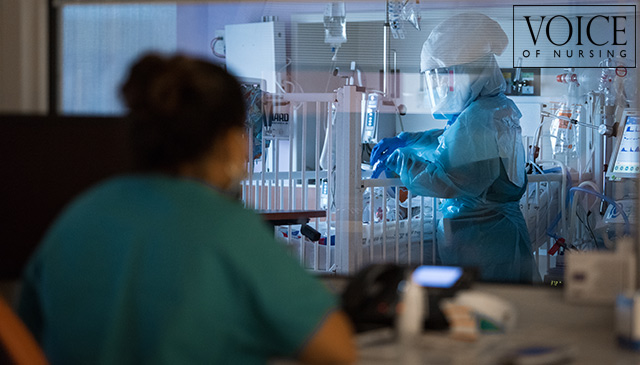
Haley Cole shares the challenges and lessons she learned caring for our COVID-19 patients and how her experience adapting to this new patient population has helped her grow as a nurse. Read more
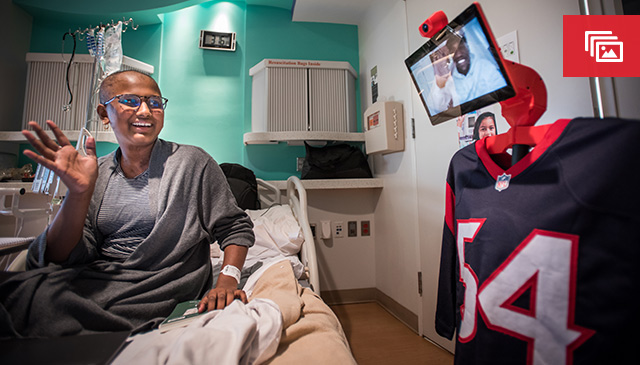
Texas Children’s celebrated PLAY 60 by cheering on the Houston Texans as they beat the Jacksonville Jaguars in the 5th Annual Kids Day game presented by Texas Children’s Hospital.
Kids Day highlights the National Football League’s PLAY 60 initiative, a campaign that encourages kids to be active for 60 minutes a day in order to reverse the trend of childhood obesity. Texas Children’s, the local presenting sponsor of PLAY 60, was featured throughout Sunday’s game.
Texas Children’s surgery patient, Matthew, served as the Coin Toss Captain. Sitting in his room at Texas Children’s in the Medical Center, he said “Go Texans! Beat the Jags!” To watch the coin toss, click here.
Even though our patients couldn’t be there in person to cheer on their team, they were there in spirit as featured cardboard cutouts in the stands at NRG Stadium. View photos of those cutouts below.
The week leading up to the game was filled with fun as well. On October 6, Houston Texans linebacker, Jacob Martin, made a special virtual visit to Cancer Center patients ahead of Sunday’s game. A robot dressed in Martin’s jersey went room to room as if he was on-site at the hospital. During this time when in-person interaction is limited, this surprise brought many smiles to patients and their families. View photos from Martin’s visit below.
Additionally, the Houston Texans Foundation donated $250,000 to Texas Children’s in support of our Pediatric Inpatient Rehabilitation Unit (IRU). The IRU works to heal patients physically and emotionally following a severe illness or traumatic injury. This gift named the unit’s gym and transformed it with encouraging phrases and Texans colors. The donation will also provide resources to help enhance the quality of life for these patients.
Click here to see a video about the IRU and Martin’s visit, and see photos of the unit below.
Texas Children’s Hospital and the Houston Texans are two winning teams that share one goal – keeping Houston kids healthy and encouraging them to be more active. To learn more about our partnership, visit: texaschildrens.org/texans.
Cutouts in the stadium
Jacob Martin’s virtual visit
Pediatric Inpatient Rehabilitation Unit
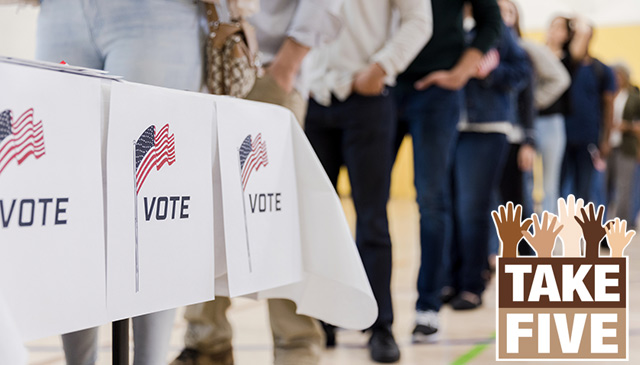
This installment of the “Take Five” series provided by The Psychology Section’s Collaborative on Racial Equity and Inclusion (REI) for Black Youth is voting and how it is a racial equity issue. Learn how you can take actions to counter voter suppression and increase representation and equity in the democratic process.
Learn about voter rights and suppression
Make sure you are registered to vote
Solidify your (safe) voting plan:
Early voting locations, including 24-hour voting (7 a.m. on October 29 to 7 p.m. October 30) and drive-through voting
November 3 voting – find a location that is convenient to you. Did you know there will be a polling place at the Texas Medical Center Commons by the waterfall?
What is your plan for pandemic safety while you vote?
Vote inside safely
Curbside voting for voters with disabilities or if you have COVID-19 symptoms/exposure
Drive-through voting
Vote by mail (if eligible)
Deliver ballot in person (if eligible for vote by mail)
VOTE! Then tell us about it – post a photo of yourself with your “I voted” sticker on social media, tag @TexasChildrens @OneAmazingTeam and include relevant hashtags: #IVoted #TCHTake5 #RacialEquity
Explore opportunities to contribute – report any election violations to election protection hotlines, get paid to be a poll worker, be a virtual or roving poll monitor, bring snacks to people in line, etc.
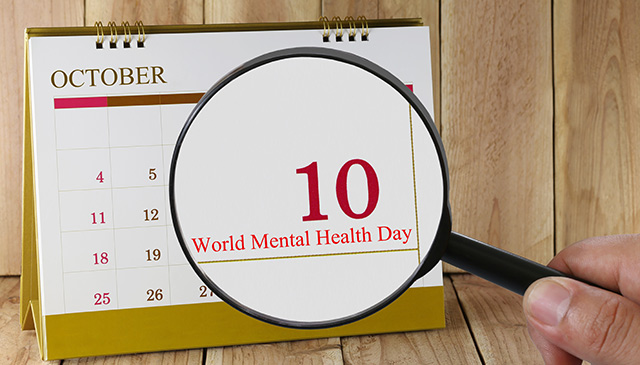
October 10 is the World Health Organization’s (WHO) annual World Mental Health Day. This year’s World Mental Health Day comes at a time when nearly every aspect of our daily lives has changed dramatically because of the COVID-19 pandemic.
Due to the pandemic, we have had to adjust to a new normal. Most of us have experienced stress both in our personal and professional lives during this unprecedented time. We often stress over our health, finances, raising children, taking care of elderly parents, and coping with uncertainty or the unknown of the COVID-19 pandemic.
“According to the Substance Abuse and Mental Health Services Administration, there are many different emotional responses during different phases of a crisis, disaster or a public health emergency,” said Texas Children’s Chief of Psychology Dr. Karin Price. “While we work among health care heroes every day, even they are not immune to anxiety, stress, discouragement and difficulty coping with uncertainty. Hope begins with open, honest conversations about mental and emotional health between trusted family members, friends, colleagues and other loved ones. If someone close to you seems to be struggling or asks for help, be there for support. You don’t have to be an expert; just listening can help a lot. If you hear something beyond your ability to help, the EAP is available to support you.”
Chronic stress over time can have effects on our bodies and make us feel exhausted. While we can’t eliminate stress from our environment, we can manage our reactions to it. The Employee Assistance Program (EAP) at Texas Children’s (833-EAP-PLUS) is designed to help all employees and eligible family members resolve personal and job-related problems as well as promote emotional health, wellness and quality of life at work and home.
“The key to stress management is choosing where to focus your energy,” said Allison Bell, Manager of the Employee Assistance Program at Texas Children’s. “You get to choose what thoughts, emotions, and problems to focus on. We want to respond, not react. We know that everyone has different ways of coping with stress. What works for me, may not work for you. The key to stress management is finding the tools and techniques that help you and using them daily. If you want to reduce your stress levels, you need to be diligent in daily practice.”
In order to encourage team members to start a daily stress management practice, EAP developed resiliency strategies to help you manage stress and boost resiliency. To get started, please review this Stress Management Resources document which provides a variety of ways to help reduce stress. Keep in mind that building resiliency will not only help reduce stress but it will also reduce anxiety, provide your body with energy, promote good sleep patterns and provide greater satisfaction with life.
For more information about EAP resources, stress management and World Mental Health Day, click here to visit the EAP website.

Everyone has their own style when it comes to managing a work desk. Some people are neat and tidy while others prefer to have a scattered environment. Studies have proven that a clean and organized work environment helps to boost productivity and morale. However, there are major security concerns to help protect the confidentiality and integrity of company data.
With countless employees processing client files, contracts, names and addresses, social security numbers, and financial information, sensitive data is left on desks at the end of each work day. Therefore whether intentional or not, the likelihood of exposure is increased.
Having important papers exposed on your desk with private details, deals, and employees’ information can make the company more susceptible to fraud, a security breach or information theft. Locking your computer screen, removing sensitive post-its, printouts and even USB drives at the end of the day will significantly reduce risk.
You can start by creating a basic list of items that are allowed in your work area to help maintain a clean space. By knowing what items are allowed on your desk, helps to better understand company policy and be more efficient with end of day clean-ups.
Here are some things to consider for your clean desk to reduce risk:
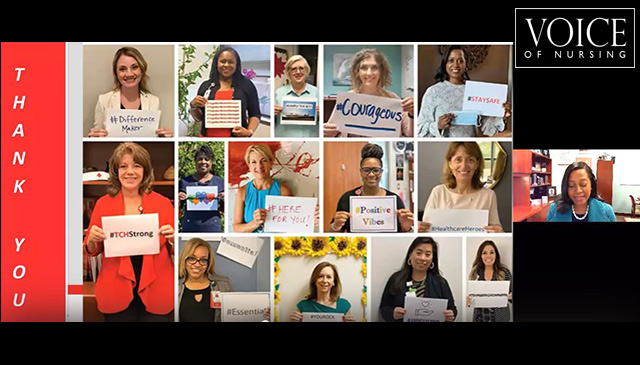
Chief Nursing Officer Mary Jo Andre shares highlights from last week’s virtual Nursing Town Hall, which included presentations on the organization’s COVID-19 response, nursing quality outcomes, and system updates. The event also included a spotlight on our Adult Congenital Heart Program and nursing recognitions. Read more